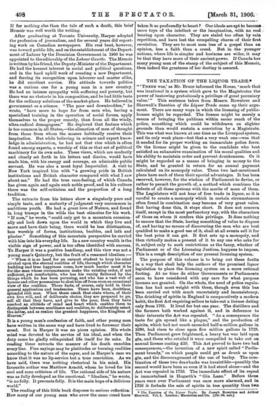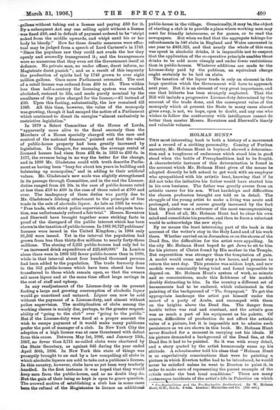THE TAXATION OF THE LIQUOR TRADE.* " THERE was,' as Mr.
Bruce informed the House, much that was irrational in a system which gave to the Magistrates the power of bestowing gratuitously a privilege of great pecuniary value." This sentence taken from Messrs. Rowntree and Sherwell's Taxation of the Liquor Trade sums up their argu- ment. There are many ways in which the licensing of public- houses might be regarded. The license might be merely a means of bringing the publican within easier reach of the police, something which could be withdrawn on slighter grounds than would sustain a conviction by a Magistrate. This was what was known at one time as the Liverpool system, and its only weak place—but that a very weak one—was that it needed for its proper working an immaculate police force. Or the license might be given to the candidate who best satisfied an exhaustive examination of his moral qualities and his ability to maintain order and prevent drunkenness. Or it might be regarded as a means of bringing in money to the State, and be granted in return for an annual payment calculated on its monopoly value. These two last-mentioned plans have each of them their special advantages. It has been reserved, however, for the wisdom of Parliament to devise, or rather to permit the growth of, a method which combines the defects of all these systems with the merits of none of them. The Legislature will not hear of free trade in liquor, so it is careful to create a monopoly which in certain circumstances often found in combination may become of very great value. But having done this, it stops short. It does not concern itself, except in the most perfunctory way, with the characters of those on whom it confers this privilege. It does nothing to ensure that the State, having something of value to dispose of, and having no means of discovering the men who are best qualified to make a good use of it, shall at all events sell it for the best price it can get. It first sets up a monopoly, and then virtually makes a present of it to any one who asks for it, subject only to such restrictions as the fancy, whether of Parliament or of the Licensing Justices, happens to impose. This is a rough description of our present licensing system.
The purpose of this volume is to bring out these faults in a way that shall help the authors of the promised liquor legislation to place the licensing system on a more rational footing. At no time do either Governments or Parliameats seem to have considered with any care for what purpose licenses are granted. On the whole, the need of police regula- tion has had most weight with them, though even this has been carried out with much uncertainty and inconsistency. The drinking of spirits in England is comparatively a modern habit, the first Act requiring sellers to take out a license dating only from 1701. It lived for but one year. The distillers and the farmers both worked against it, and in deference to their interests the Act was repealed. "As a consequence the taste for gin spread like a plague," and the production of spirits, which had, not much exceeded half-a-million gallons in 1690, had risen to close upon five million gallons in 1729. Then Parliament grew frightened, a heavy tax was laid upon gin, and those who retailed it were compelled to take out an annual license costing £20. This Act proved to have two bad consequences,—the invention of a new spirit called "Parlia- ment brandy," on which people could get as drunk as upon gin, and the discouragement of the use of barley. The com- bination of these two drawbacks was irresistible—possibly the second would have been so even if it had stood alone—and the Act was repealed in 1733. The immediate effect of its repeal is immortalised in Hogarth's "Gin Lane." Before three years were over Parliament was once more alarmed, and in 1736 it forbade the sale of spirits in less quantity than two The Taxation of the Liquor Trade. By joeeph Bowntree and Arthur Sherwell. Vol. L London : Diacmi]ian and Co. [103. 6d. net.]
gallons without taking out a license and paying £50 for it. By a subsequent Act any one selling spirit without a license was fined 210, and in default of payment ordered to be "stript naked from the middle upwards, and whipt until his or her body be bloody." How far these drastic measures were effec- _ teal may be judged from a speech of Lord Carteret's in 1743. "Since the populace saw they could not evade the law they openly and avowedly transgressed it; and the transgressors were so numerous that they even set the Government itself at defiance. No private man, no under officer, durst inform, no Magistrate durst punish " ; and as a result of this impunity the production of spirits had by 1743 grown to over eight million gallons. Once more Parliament retreated. The cost of a retail license was reduced from 250 to Bl. Thus within less than half-a-century the licensing system was created, abolished, restored to life, and made purely nominal by the smallness of the price charged for the license,-21 instead of 250. Upon this footing, substantially, the law remained till 1880. All this time, however, the value of the monopoly was growing, though it had escaped the notice of a Parliament which continued to direct its energies "almost exclusively to restrictive legislation."
In 1879 a Select Committee of the House of Lords, "apparently more alive to the fiscal anomaly than the Members of a House specially charged with the care and control of the national finances," pointed out that the value of public-house property had been greatly increased by legislation. In Glasgow, for example, the average rental of licensed houses had risen from £31 6s. in 1853 to 293 6s. in 1877, the revenue being in no way the better for the change, and in 1880 Mr. Gladstone could with truth describe Parlia- ment as having been "busy for about ten years in building and bolstering up monopolies," and in adding to their artificial values. Mr. Gladstone's new scale was slightly strengthened in its passage through Committee, and in the end the License- duties ranged from 24 10s. in the case of public-houses rated at less than £10 to 260 in the case of those rated at 2700 and over. The inadequacy of these duties was partly due to Mr. Gladstone's lifelong attachment to the principle of free trade in the sale of alcoholic liquor. As late as 1895 he wrote : "Free trade, with strict police supervision and adequate taxa- tion, was unfortunately refused a fair trial." Messrs. Rowntree and Sherwell have brought together some striking facts in proof of the disregard of the public interest which has been shown in the taxation of public-houses. In 1881 96,727 publicans' licenses were issued in the United Kingdom; in 1904 only 91,502 were issued. Yet in the interval the population had grown from leas than thirty-five millions to nearly forty-three millions. The closing of 5,225 public-houses had only led to "an increased drink expenditure of 223,449,000." In London alone there were in 1903 552 fewer public-houses than in 1890, while in that interval about four hundred thousand persons had been added to the population. The trade formerly done in the 552 public-houses which have been closed has been transferred to those which remain open, so that the owners sell more liquor and at the same time effect large savings in the cost of staff and upkeep.
In any readjustment of the License-duty on its present footing a large and growing consumption of alcoholic liquor would go unnoticed and untaxed. Liquor can now be sold without the payment of a License-duty, and almost without police supervision. The multiplication of clubs among the working classes is mainly due, perhaps, to the greater respect- ability of "going to the club" over "going to the public." But if. the License-duty were fixed at a proper amount the wish to escape payment of it would make many publicans prefer the post of manager of a club. In New York City the adoption of a high license was at once threatened with defeat from this cause. Between May 1st, 1896, and January 13th, 1897, no fewer than 3,711 so-called clubs were chartered by the State - Secretary, as against 845 during the year ended April 30th, 1896. In New York this state of things was -promptly brought to an end by a law compelling all clubs in which alcoholic liquors are sold to take out a publican's license. In this country, however, clubs have as yet been very tenderly , handled. In the first instance it was hoped that they would -keep men from the public-house, and so no doubt they do. Eublhe gain of their being so kept is open to grave question. The avowed motive of establishing a club has in some cases been the refusal of- the Magistrates to license an additional
public-house in the village. Occasionally, it may be,the object of starting a club is to provide a place where working men may meet for friendly intercourse, or for games, or to read the newspapers. But when we find that the aggregate takings for refreshments in 540 clubs in England and Wales amounted in one year to 2431,323, and that nearly the whole of this sum was spent in alcoholic drinks, it is impossible not to suspect that the application of the co-operative principle enables these drinks to be sold more cheaply and under fewer restrictions than in public-houses. Whatever additions are made to the License-duty paid by the publican, an equivalent charge ought certainly to be laid on clubs.
The taxation of the liquor trade is only an element in the large question which the Government will have to approach next year. But it is an dement of very great importance, and one that hitherto has been strangely neglected. That the Bill will include a progressive License-duty determined by the amount of the trade done, and the consequent value of the monopoly which at present the State in many oases almost gives away, is not, we hope, open to doubt, and any one who wishes to follow the ,controversy with intelligence cannot do better than master Messrs. Rowntree and Sherwell's timely and valuable volume.











































 Previous page
Previous page